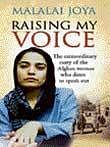

In September 2001, soon after the New York World Trade Centre was felled, and the winds of war began to blow over Afghanistan, an optimism strangely gripped feminists the world over. At last, the Taliban would be overthrown and the women of Afghanistan would be free! So we all thought. Operation Enduring Freedom brought in its wake much ‘collateral damage’, and the historic Loya Jirga of 2003, where a young women from the Afghan province of Farah, made headlines.
Malalai Joya boldly raised her voice against the warlords and false mujahideens who had participated in the jirga and were set to form an already decided administration. Predictably, she made enemies among the rich and powerful in Kabul but, at 27, became the youngest member of the Afghan Parliament in 2005.
Malalai was four days old when Soviet troops entered Afghanistan. Her family fled war-torn Afghanistan — first to Iran and then to Pakistan, where she grew up in refugee camps. She became an activist, teaching and administering medical aid to fellow Afghans in the camp. Her skills brought her back to her native province of Farah where, under the Taliaban regime, she continued to run clandestine schools for girls and promoted women’s rights. After the Taliban were overthrown, Malalai participated in the historic Loya Jirga of 2003, as the voice of her people — ‘the barefooted people of Afghanistan’.
She made headlines across the world as she warned of the grave implications for Afghanistan, where puppets handpicked by the US under the façade of elections were being planted in parliament.
Hamid Karzai was nothing but a US puppet, and the Afghan parliament full of representatives of warring factions — the very war lords who had brought on the destruction of Afghanistan with their mercenary and partisan interests. Malalai was abused, denigrated, hounded out of the jirga and attempts were made on her life. But she continued to raise her voice against the rogues and thugs who dominated the establishment and against the inability of the Karzai government to improve the lot of the Afghans or to banish the Taliban and provide security to the country, in spite of the billions of dollars of foreign aid and the numerous foreign troops stationed on Afghan soil for eight years now. Simultaneously, she continued to work for her people in Farah, raising funds, training and empowering others and alternately travelling to other countries, unmasking the sham democracy. Her brutal honesty won her many opponents, including women Afghan Parliamentarians. Ultimately, branded a traitor, she had to resign from parliament.
Raising My Voice is an important testimony by an Afghan — of life in war-scarred Afghanistan since the beginning of the Soviet occupation, right through the years of the Afghan jihad and the horrors of the Taliban regime, to the failure of the war on terror. Recording the nightmare that millions of Afghans continue to live with, this is one of the few books that have come out from within Afghanistan, as opposed to the tomes that have been written on Afghanistan.
The recent debacle of the Afghan elections further vindicates Malalai’s stand. All the corruption, human rights violation, and internecine rivalry seem to have surfaced, ripping apart the veil that had shaded Afghanistan from the eyes of the world. Eight years after the liberation of Kabul, the Taliban are nowhere near oblivion. Just as women are no more liberated and secure than they were eight years ago. Legislation continues to legitimise violence against women — marital rape is legal and men can deny their wives food if they refused sexual demands, while women require permission from their husbands to work.
Though the book addresses a primarily western audience and reposes too much trust in Human Rights Watch and Amnesty International, almost the only sources that statistics are quoted from, it will not be far-fetched to say that the alternatives Malalai provides can perhaps serve as the blueprint for a future Afghanistan. For she reminds us, “They may cut down the flower, but they will never stop the coming of the spring.”